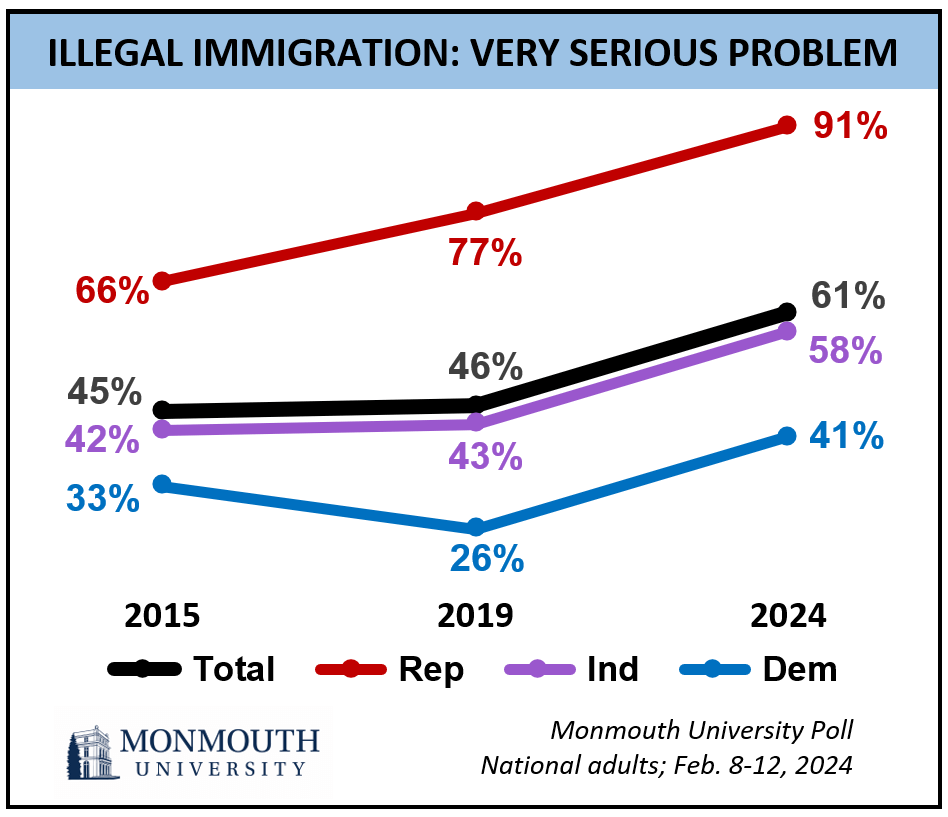West Long Branch, NJ – Public concern about illegal immigration is higher during President Joe Biden’s term than it was under the prior two administrations, according to the latest national Monmouth (“Mon-muth”) University Poll. A majority of Americans support building a border wall for the first time since Monmouth started asking this question in 2015. Nearly half say the bipartisan border deal that was blocked in the U.S. Senate earlier this month is not tough enough on illegal immigration.

More than 8 in 10 Americans see illegal immigration as either a very serious (61%) or somewhat serious (23%) problem. The 6 in 10 who describe it as a very serious problem represents a jump from polls taken at the end of former President Barack Obama’s administration to the midpoint of former President Donald Trump’s term. Specifically, the view that illegal immigration poses a very serious problem for the country ranged between 43% and 49% from 2015 to 2019. Concern about illegal immigration has increased among all partisan groups. This rise is most notable among Republicans, from 66% very serious in 2015 to 77% in 2019 and 91% in the current poll. Among independents, 58% say this is a very serious problem, up from just over 4 in 10 who said the same in both 2015 (42%) and 2019 (43%). A similar level of concern among Democrats now stands at 41%, after dipping from 33% in 2015 to 26% in 2019.
“Illegal immigration has taken center stage as a defining issue this presidential election year. Other Monmouth polling found this to be Biden’s weakest policy area, including among his fellow Democrats,” said Patrick Murray, director of the independent Monmouth University Polling Institute.
A majority of the public (53%) supports building a wall along the U.S. border with Mexico, compared with 46% who oppose it. During the Trump administration, support for this project registered no higher than 44% and stood as low as 35%. Support stood at 48% the first time Monmouth asked this question (September 2015) and 42% the last time this question was included in one of Monmouth’s national polls (April 2019). Compared to public opinion nine years ago, support for building a border wall has increased by 13 points among Republicans (from 73% to 86%) and 11 points among independents (from 47% to 58%), but it has declined by 14 points among Democrats (from 31% to 17%).
Most (61%) Americans say immigrants seeking political asylum at the border should be made to stay in Mexico while their claims are processed. Just 35% say they should be allowed into the U.S. while they wait. Five years ago, slightly more supported allowing asylum-seekers to wait in the U.S. (41%) while the number who wanted them to stay in Mexico (51%) was somewhat lower than it is now. Support for keeping asylum-seekers on the other side of the border as their claims are processed has increased among all partisan groups compared with 2019.
About 1 in 3 (32%) think that illegal immigrants are more likely than other Americans to commit violent crimes like rape or murder. This marks an increase in this view from prior polls (21% in 2019 and 17% in 2015). Another 24% say illegal immigrants are less likely to commit such crimes – which is the same level as in prior polls – and 39% say they are just as likely – which marks a decline in this view. The shift in opinion that illegal immigrants are more prone to violent crime has grown most dramatically among Republicans – from just 29% in 2015 to 45% in 2019 and 65% in 2024. By comparison, the changes in this view among other partisan groups has been much less significant – from 15% in 2015 to 26% in 2024 among independents and from 10% in 2015 to 12% now among Democrats.
One area where views of illegal immigration have been more stable is its economic impact. Specifically, just 28% of the public feels that illegal immigrants take jobs away from American citizens. Most (62%) say illegal immigrants fill jobs that Americans do not want. Overall opinion has not shifted by more than a few points since 2015, although Republicans (53%) are more likely to feel illegal immigrants take away desirable jobs than said the same nine years ago (39%) at the same time Democrats (91%) are more likely to say these immigrants take unwanted jobs than in 2015 (70%).
Just under half (47%) of the public has heard a lot about recent negotiations on a bipartisan bill to deal with immigration and secure the U.S. border. There is somewhat more opposition (33%) than support (23%) among those who have formed an assessment of this bill, although nearly half (45%) have no opinion of it. A majority (56%) of Republicans oppose this bill, including 78% of Republicans who have heard a lot about it. A third (32%) of independents oppose this bill, including 48% of independents who have heard a lot. On the other hand, 41% of Democrats are in favor of this legislation – a number that rises to 57% among those who have heard a lot about it.
Nearly half (47%) of the American public feels this border bill is not tough enough when it comes to dealing with illegal immigration, while 28% say it is about right and 12% feel it is too tough. Three-quarters (77%) of Republicans and half (48%) of independents say the bill is not tough enough on illegal immigration, while half (51%) of Democrats say it is about right.
“These results illustrate why the border deal was dead on arrival. The vast majority of rank and file Republicans and many independents believe it is too soft on illegal immigration, even if they don’t know exactly what’s in the legislation. Senate GOP leadership could have tried to sell the bill, but that would have almost certainly been fruitless once Donald Trump weighed in against it,” said Murray.
In congressional action earlier this month, nearly all Republican senators along with a handful of Democrats voted against allowing the border deal to come up for a full vote. However, 48% of the public blames both parties equally for blocking this bill, while 36% say the Republicans are more responsible and 13% say the Democrats are more responsible.
The Monmouth University Poll was conducted by telephone from February 8 to 12, 2024 with 902 adults in the United States. The question results in this release have a margin of error of +/- 4.1 percentage points for the full sample. The poll was conducted by the Monmouth University Polling Institute in West Long Branch, NJ.
QUESTIONS AND RESULTS
(* Some columns may not add to 100% due to rounding.)
[Q1-8 previously released.]
9.How serious a problem do you think the issue of illegal immigration is for the United States right now – very, somewhat, not too, or not at all serious?
| Trend: | Feb. 2024 | April 2019 | Nov. 2018 | Jan. 2018 | Sept. 2017 | Sept. 2015 |
|---|---|---|---|---|---|---|
| Very serious | 61% | 46% | 49% | 45% | 43% | 45% |
| Somewhat serious | 23% | 25% | 21% | 25% | 30% | 30% |
| Not too serious | 10% | 16% | 15% | 16% | 17% | 15% |
| Not at all serious | 5% | 12% | 13% | 13% | 10% | 9% |
| (VOL) Don’t know | 1% | 1% | 1% | 1% | 1% | 2% |
| (n) | (902) | (801) | (802) | (806) | (1,009) | (1,009) |
10.Do you favor or oppose building a wall along the U.S. border with Mexico?
| Trend: | Feb. 2024 | April 2019 | March 2019 | Jan. 2019 | Jan. 2018 | Sept. 2017 | Sept. 2015 |
|---|---|---|---|---|---|---|---|
| Favor | 53% | 42% | 44% | 44% | 40% | 35% | 48% |
| Oppose | 46% | 56% | 51% | 52% | 57% | 60% | 43% |
| (VOL) Don’t know | 1% | 3% | 4% | 4% | 3% | 5% | 10% |
| (n) | (902) | (801) | (802) | (805) | (806) | (1,009) | (1,009) |
11.Do you think illegal immigrants coming to this country today take jobs away from American citizens, or do they mostly take jobs Americans don’t want?
| Trend: | Feb. 2024 | April 2019 | Sept. 2017 | Sept. 2015 |
|---|---|---|---|---|
| Take jobs away from American citizens | 28% | 24% | 23% | 26% |
| Take jobs Americans don’t want | 62% | 60% | 59% | 59% |
| (VOL) Both | 4% | 9% | 12% | 10% |
| (VOL) Don’t know | 6% | 7% | 5% | 6% |
| (n) | (902) | (801) | (1,009) | (1,009) |
12.Do you think illegal immigrants are more likely, less likely, or about as likely as other Americans to commit violent crimes like rape or murder?
| Trend: | Feb. 2024 | April 2019 | Nov. 2018 | Sept. 2015 |
|---|---|---|---|---|
| More likely | 32% | 21% | 21% | 17% |
| Less likely | 24% | 24% | 24% | 20% |
| About as likely | 39% | 50% | 51% | 59% |
| (VOL) Don’t know | 4% | 5% | 4% | 4% |
| (n) | (902) | (801) | (802) | (1,009) |
13.Should immigrants seeking political asylum at the border be allowed into the U.S. while they wait for their claims to be processed or should they be made to stay in Mexico?
| Trend: | Feb. 2024 | April 2019 |
|---|---|---|
| Allowed into the U.S. | 35% | 41% |
| Made to stay in Mexico | 61% | 51% |
| (VOL) Don’t know | 4% | 8% |
| (n) | (902) | (801) |
14.Republicans and Democrats in the Senate have been negotiating a bipartisan bill to deal with immigration and secure the U.S. border. How much have you heard about this – a lot, a little, or nothing at all?
| Response: | Feb. 2024 |
|---|---|
| A lot. | 47% |
| A little | 38% |
| Nothing at all | 16% |
| (n) | (902) |
15.Based on your first impressions, do you favor or oppose this immigration bill, or do you have no opinion?
| Response: | Feb. 2024 |
|---|---|
| Favor | 23% |
| Oppose | 33% |
| No opinion | 45% |
| (n) | (902) |
16.Do you think this bill is too tough, not tough enough, or about right when it comes to dealing with illegal immigration?
| Response: | Feb. 2024 |
|---|---|
| Too tough | 12% |
| Not tough enough | 47% |
| About right | 28% |
| (VOL) Don’t know | 14% |
| (n) | (902) |
17.Despite being negotiated by senators from both parties, the bill will not be allowed to come up for a vote. Who is more responsible for blocking this bill – the Republicans in Congress, the Democrats in Congress, or both parties equally? [FIRST TWO CHOICES WERE ROTATED]
| Response: | Feb. 2024 |
|---|---|
| Republicans in Congress | 36% |
| Democrats in Congress | 13% |
| Both parties equally | 48% |
| (VOL) Don’t know | 3% |
| (n) | (902) |
[Q18-34 previously released.]
[Q35-37 held for future release.]
METHODOLOGY
The Monmouth University Poll was sponsored and conducted by the Monmouth University Polling Institute from February 8 to 12, 2024 with a probability-based national random sample of 902 adults age 18 and older. Interviews were conducted in English, and included 183 live landline telephone interviews, 362 live cell phone interviews, and 357 online surveys via a cell phone text invitation. Telephone numbers were selected through a mix of random digit dialing and list-based sampling. Landline respondents were selected with a modified Troldahl-Carter youngest adult household screen. Interviewing services were provided by Braun Research, with sample obtained from Dynata (RDD, n= 557), Aristotle (list, n= 152) and a panel of prior Monmouth poll participants (n= 193). Monmouth is responsible for all aspects of the survey design, data weighting and analysis. The full sample is weighted for region, age, education, gender and race based on US Census information (ACS 2021 one-year survey). For results based on this sample, one can say with 95% confidence that the error attributable to sampling has a maximum margin of plus or minus 4.1 percentage points adjusted for sample design effects (1.56). Sampling error can be larger for sub-groups (see table below). In addition to sampling error, one should bear in mind that question wording and practical difficulties in conducting surveys can introduce error or bias into the findings of opinion polls.
Demographics (weighted)
Party (self-reported): 28% Republican, 40% Independent, 32% Democrat
Sex: 48% male, 51% female, 1% other
Age: 29% 18-34, 33% 35-54, 38% 55+
Race: 61% White, 12% Black, 17% Hispanic, 10% Asian/other
Education: 37% high school or less, 29% some college, 19% 4 year degree, 15% graduate degree
Click on pdf file link below for full methodology and crosstabs by key demographic groups.




